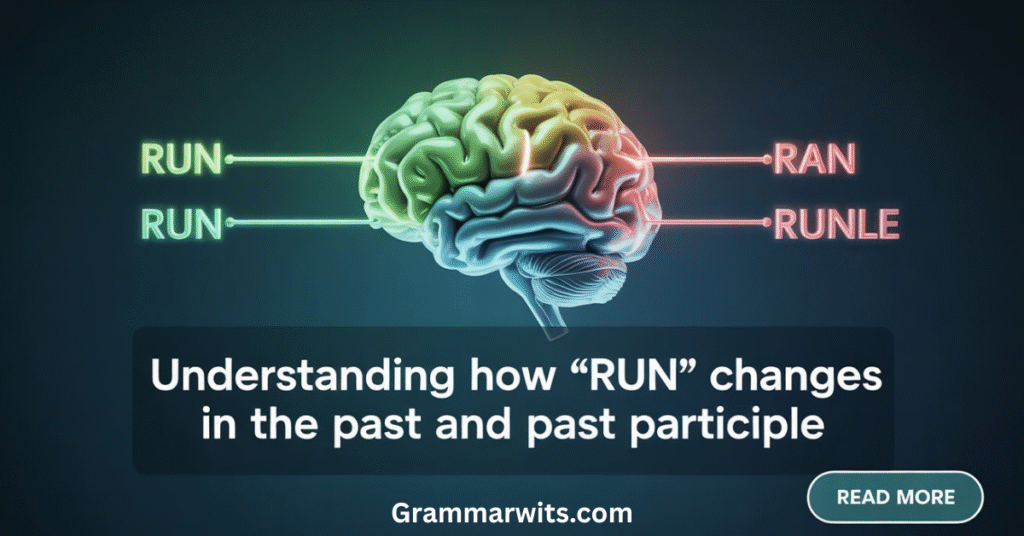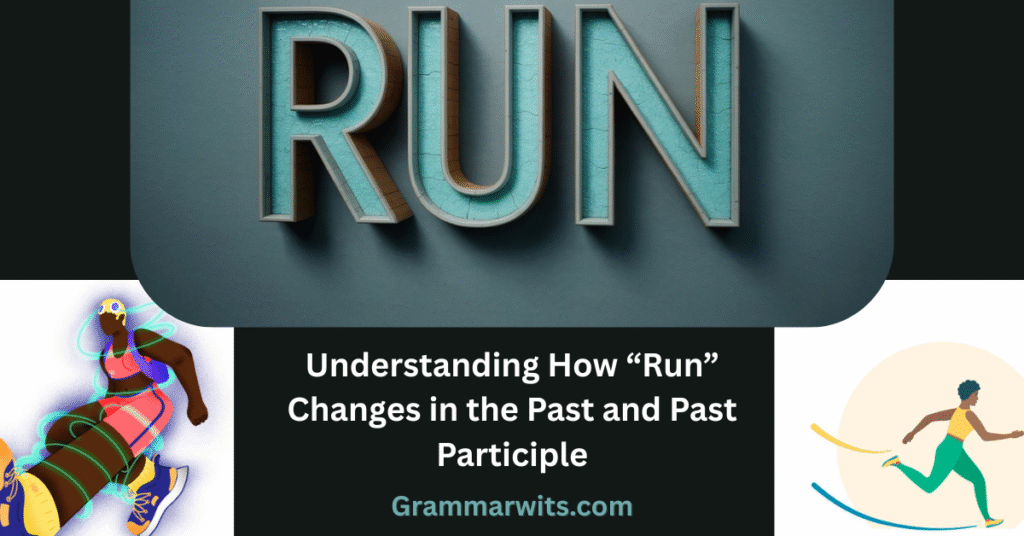The verb “run” changes form when used in the past tense and past participle, which are essential for expressing actions that have already happened or are connected to the present. In English grammar, the past tense of “run” is “ran,” while the past participle remains “run.” These forms play a crucial role in constructing different tenses and ensuring clear, accurate communication. Understanding these changes helps avoid common mistakes and improves overall language fluency.
Mastering how “run” transforms across tenses unlocks the power to narrate stories, describe experiences, and write with confidence. This subtle shift in form might seem small, but it carries a big impact on how effectively you express time and action in both speech and writing. Grasping these nuances gives you the edge in sounding natural and precise when using this versatile verb.
By learning the past and past participle forms of “run,” you open doors to better grammar skills and clearer conversations. Whether in everyday chats or formal writing, knowing these forms makes your English more polished and professional. The journey into the world of “run” is a simple yet vital step toward mastering verb
The Three Essential Forms of Run – Your Quick Reference
Every English verb has multiple forms, and run is an irregular verb that doesn’t follow standard patterns. Here’s what you need to memorize:
| Form | Example | Usage |
|---|---|---|
| Present tense run | I run every morning | Current actions or habits |
| Past tense ran | She ran yesterday | Completed past actions |
| Past participle run | They have run the marathon | Perfect tenses and passive voice |
Memory trick: Think “Run today, ran yesterday, have run before.” This simple phrase helps you remember that the past participle returns to the same spelling as the present tense.
The present participle running adds “-ing” to show ongoing actions. Unlike many verb conjugation rules, run keeps its unique pattern across all tenses.
Past Tense Ran – When and How to Use It Correctly

The past tense of run is always “ran” – never “runned.” This applies whether you’re talking about physical movement, operating something, or managing a business.
Key Rules for Using Ran
Time markers that signal you need the past tense ran include:
- Yesterday, last week, last month
- Specific times in the past (at 3 PM, on Monday)
- Sequential past events (first, then, after that)
Real-World Run Examples in Past Tense
Sports and fitness contexts:
- “Maria ran the Boston Marathon last spring.”
- “The team ran their fastest time this season.”
- “I ran five miles before breakfast yesterday.”
Business and operational scenarios:
- “The company ran smoothly under new management.”
- “We ran out of supplies during the busy season.”
- “The software ran without errors for six months straight.”
Daily activities and situations:
- “He ran to catch the departing train.”
- “The children ran through the sprinklers all afternoon.”
- “They ran into their old teacher at the grocery store.”
Common Mistakes with Past Tense Ran
Never say “I have ran” – this mixes past tense with perfect tense incorrectly. The correct form uses the past participle: “I have run.”
Past Participle Run – Perfect Tenses and Passive Voice Mastery
The past participle of run looks identical to the present tense, but it serves completely different grammar rules. You’ll always use past participle run with helping verbs like have, has, had, or been.
Present Perfect Examples with Run
Present perfect connects past actions to the present moment:
- “I have run this route many times before.”
- “The program has run successfully since January.”
- “We have run three experiments this week.”
These sentences emphasize experience or results that matter now.
Past Perfect Scenarios Using Run
Past perfect shows one past action happened before another:
- “By sunset, we had run completely out of water.”
- “The machine had run for twelve hours before breaking down.”
- “She had run the department for five years when I arrived.”
Passive Voice Applications with Run
In passive constructions, run becomes the main verb:
- “The test was run by qualified technicians.”
- “Several experiments have been run to verify results.”
- “The campaign will be run by our marketing team.”
Using Run in Different Tenses – Complete Usage Guide

Mastering verb run means understanding how it works across all tenses. Each form serves specific communication purposes.
Present Continuous: “Am/Is/Are Running”
- “I am running late for the meeting.”
- “The engine is running smoothly now.”
- “They are running their annual sale this month.”
Future Tense: “Will Run”
- “I will run the presentation tomorrow.”
- “The new system will run faster than before.”
- “We will run additional tests next week.”
Conditional Forms: “Would Run”
- “I would run every day if I had time.”
- “The plan would run more efficiently with better funding.”
- “She would run the project differently.”
Phrasal Verbs with Run and Tense Changes
Phrasal verbs maintain the same past tense and past participle patterns:
| Present | Past | Past Participle |
|---|---|---|
| run into | ran into | have run into |
| run out of | ran out of | have run out of |
| run up | ran up | have run up |
| run down | ran down | have run down |
Examples of phrasal verbs in context:
- “I ran into my neighbor at the store.” (past)
- “We have run out of coffee.” (present perfect)
- “They ran up huge bills last month.” (past)
Common Errors and How to Fix Them

Writing with correct tense requires avoiding these frequent mistakes:
“I Have Ran” vs. “I Have Run”
Wrong: “I have ran five miles today.” Correct: “I have run five miles today.”
The helper verb “have” always requires the past participle run, never the past tense ran.
Regional Variations and Non-Standard Usage
Some dialects use “I have ran,” but standard English grammar consistently uses “I have run” in formal writing and professional speaking in past tense.
ESL Student Trouble Spots
Language learning challenges often include:
- Confusing past tense ran with past participle run
- Adding “-ed” to create “runned” instead of using ran
- Mixing up present participle running with other forms
Practice Exercises That Actually Work
Fill-in-the-Blank Scenarios
- Yesterday, she _____ to the store. (Answer: ran)
- I have _____ this course before. (Answer: run)
- The computer is _____ slowly today. (Answer: running)
Sentence Transformation Exercises
Transform these present tense examples to past:
- “I run every morning” → “I ran every morning”
- “The program runs well” → “The program ran well”
- “They run the business” → “They ran the business”
Real Conversation Practice Prompts
Practice using verbs correctly in these scenarios:
- Describing your exercise routine from last week
- Explaining how a project went in your previous job
- Telling someone about a race you completed
Quick Reference Summary

Run Conjugation Cheat Sheet
- Present: I/you/we/they run; he/she/it runs
- Past: All subject pronouns use ran
- Past Participle: Always run with helping verbs
- Present Participle: Always running for ongoing actions
When to Use Each Form
✓ Use ran for completed past actions ✓ Use run with have/has/had for perfect tenses ✓ Use running for ongoing or continuous actions ✓ Use run for present habits or facts
Frequently Asked Questions
Is it “I have ran” or “I have run”?
Always use “I have run.” The past participle of run is “run,” not “ran.” This applies to all perfect tenses in English grammar.
What’s the difference between “ran” and “run” in past tense?
“Ran” is the simple past tense for completed actions. “Run” is the past participle used with helping verbs like have, has, or had.
Can you say “runned” instead of “ran”?
No. “Run” is an irregular verb, so its past tense is “ran,” never “runned.” Regular verb changes in past add “-ed,” but run follows its own pattern.
How do I know when to use “had run” vs. “have run”?
Use “had run” (past perfect) when describing something that happened before another past event. Use “have run” (present perfect) when connecting past actions to the present.
Do phrasal verbs with “run” follow the same patterns?
Yes. All phrasal verbs with run use the same past tense (ran) and past participle (run) forms as the main verb.
Your Next Steps to Master Irregular Verbs
It belongs to a group of irregular verbs that follow similar patterns. Others include come/came/come and become/became/become.
Focus on tense examples in your daily English language practice. Read sentences aloud, write short paragraphs using different tenses, and gradually build confidence with the forms and other challenging English verbs.
Remember: consistent practice with real examples beats memorizing rules alone. Start using it correctly in your conversations today, and watch your language learning accelerate naturally.

Alizy Smith is a passionate language enthusiast and the admin of Grammar Wits. With a love for wordplay, grammar quirks, and witty expressions, she’s dedicated to making language learning fun and accessible. From grammar tips to pun-filled laughs, Alizy ensures every piece of content entertains while educating — turning tricky rules into easy, enjoyable reads.





